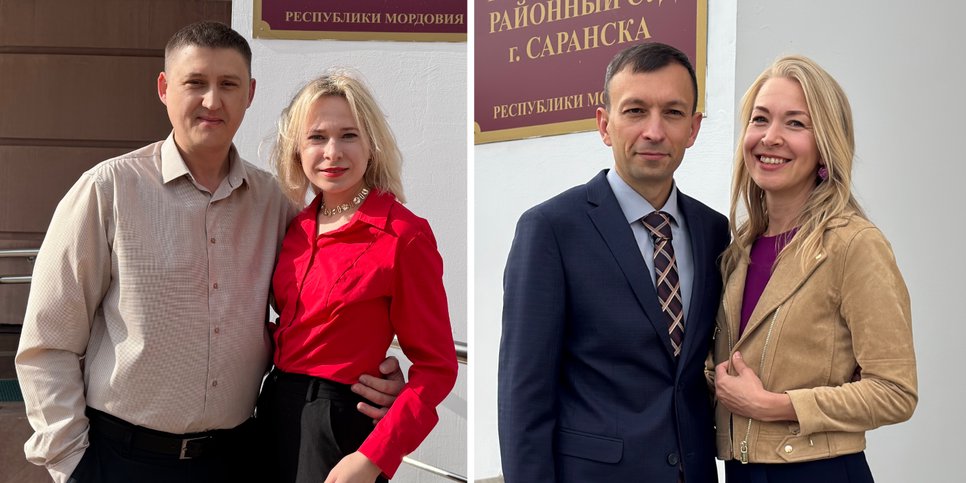Ivan Neverov with his wife Tatyana and Mikhail Shevchuk with his wife Yaroslavna in front of the district court in Saransk
Ivan Neverov with his wife Tatyana and Mikhail Shevchuk with his wife Yaroslavna in front of the district court in Saransk
On September 19, 2025, the court announced the decision in the case of Ivan Neverov and Mikhail Shevchuk, whose family of Jehovah's Witnesses were repressed in Soviet times. The court sentenced Ivan Neverov to 7 years in a penal colony and Mikhail Shevchuk to 6.5 years. They were taken into custody in the courtroom.
Back in 2016, before the liquidation of the organization of Jehovah's Witnesses in Russia, Neverov and Shevchuk were eyewitnesses to searches in a building for worship. "Riot police and officers of the Center for Counteracting Extremism came and again planted literature," Ivan recalls.
Years later, Shevchuk's younger brother, Aleksandr, and Neverov's half-brother, Vladimir Atryakhin, were sentenced to various terms of imprisonment for their beliefs. Soon also the homes of the believers were searched. Ivan and Mikhail were charged with "organizing the activity of an extremist organization."
Not all relatives coped with the shock. Shevchuk's wife, Yaroslavna, said: "My grandmother lived with us, she was nearly 91 years old. During the search she was very stressed. This knocked her off her feet. She could not calm down and eventually after 6 months she died... Her heart could not take it."
During the preliminary investigation, the believers spent 2.5 months in pretrial detention and more than 3 months under house arrest. At that point, it became evident that law enforcement officers had been bugging Neverov's house. "The recordings spanned about two years," Ivan said. "Someone had been listening into all our private life. That's so unpleasant."
The Proletarskiy District Court has been considering the case for the last 6 months; the trial was fast-paced, with four sessions per week, despite repeated requests from the defense to change the schedule. Inevitably the pace adversely affected the life of the believers and their families. "I lost clients," said Ivan Neverov, a highly skilled decorator. "I still have my reputation though, and friends put jobs my way. But the hearings, the preparation for them... it was good if I managed to work for 2-3 hours a week."
Mikhail Shevchuk, a furniture maker and highly skilled handyman, added: "If, for example, there are 4 days of trial in a week, how much time is left? And when you go work, what state is your mind in..." As both men mentioned, thanks to the efforts of their wives and the support of friends, they lacked nothing.
Ivan and Mikhail believe that their innocence has been proven. At one of the hearings, Shevchuk and Neverov provided the court with a list of 39 inconsistencies that they had found in the witness testimonies. "Every time we asked the prosecution the question "where is extremism, where is at least one piece of evidence, at least one word or statement", the officers who conducted the operational-investigative measures said that they had not heard any such thing. Obviously, the whole charge is false." Despite this, the prosecutor's office requested 8 years imprisonment for Mikhail and 9 for Ivan.
Mikhail Shevchuk is a fourth-generation Jehovah's Witness. Back in the 1940s, two of his great-grandfathers were sentenced to long terms of imprisonment with confiscation of property and subsequent exile to Siberia. The repressions of believers in Soviet times ended with their rehabilitation. In modern-day Russia, the prosecution of Jehovah's Witnesses has resumed, despite condemnation from the world community.


